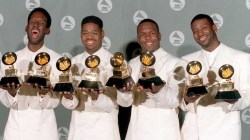Days after King Kendrick Lamar released To Pimp A Butterfly, HipHopDX Editor-In-Chief Justin Hunte called the album “ambitious in its attempt to inspire a generation to change the world for the better and poignant enough to actually do so.” Ladies and gentlemen, behold “Compton: A Soundtrack By Dr. Dre,” a Homeric West Coast narrative from K.Dot’s ideological benefactor. Dre balances a tightrope of contrasting dualities with true unapologetic mastery or life of opulence despite current racial tensions focused primarily on the poor and doing what he can to articulate those uneasy truths. Hell, at age 50, Andre Young has spent significant time living the extremes of both. Regardless of his status as Hip Hop’s first almost billionaire, Dre is just as antagonistic as ever. Those ideas exist both thematically and sonically throughout the entire 62 minute runtime. Like TPAB, Compton is a personal testimonial of personal responsibility exceeding overwhelming odds. This time, instead of making freshly discovered values a centered focal point, D.R.E.’s 16-year-in-the-making masterpiece displays the fruits they eventually bring as time moves forward.
For quite some time, D.R.E. mentioned his cinematic aspirations for a mythological project once called Detox. From the title alone, CPT’s golden child yearned to creatively ascend past the raw young hedonism present on landmark offerings The Chronic and 2001. The struggle was evident through various leaks, alongside two singles in-between, that commercially succeed but failed to build substantial buzz. Finding inspiration from N.W.A. biopic Straight Outta Compton, a story organically connected to (alongside several songs being featured in the film), he’s found clarity in where the past and present fuel each other. All this while embracing his inner Scorsese. Each of Compton’s 16 tracks feel like individual set pieces bound together perfectly. From an intro detailing the area’s dark and racially based history to the credits closer “Talking To My Diary,” there’s indestructible structure. Most importantly, the music reflects various dynamics of emotions.
Playing director, Dre ensures the right co-stars and cameos serve the ultimate purpose; articulating his vision through characters appearing only when necessary. “Talk About It” featuring buzzing emcees King Mez and Justus speak aspirations as hell burns around them, something the Aftermath head gets better than anyone. Having DJ Dahi co-produce gives a contemporary trap bounce that thankfully doesn’t repeat itself again throughout the project. By the time “Talk About It” hits its final note, the energy doesn’t let up as he ups the guest profile. There isn’t a better example than follow-up track “Genocide” featuring Kendrick Lamar, Marsha Ambrosius and newcomer Candice Pillay. West Coast OGs including Ice Cube, Xzibit and Snoop Dogg get some screen time as well. That doesn’t even count guest appearances from Eminem to Jill Scott. Simply put, Compton’s ensemble cast oozes top notch.
Be clear though, this is Dre’s show. He challenges me-too Hip Hop trends without sounding like a grumpy-old-man on “Satisfiction,” uses audio from Jimmy Iovine to stress the importance of hard work through “All In A Day’s Work,” and the explains the pressures of being on top on “Deep Water.” While previous works provided subtle social commentary on race in America, there are enough moments like “Animals” featuring Anderson .Paak which features guest production from another iconic producer DJ Premier. Those looking for good braggadocios rhymes for the sake of them are in luck the “İnce İnce Bir Kar Yağar” sampled “Issues” and “For The Love of Money,” a track including one of several interesting Eazy-E references.

AD LOADING...
Despite watching music change so rapidly over the decades, Dre still has an acute ear for sound; reflecting heavily in Compton’s production more influence by Maggot Brain era Funkadelic than Mothership Connection P-Funk sonics. The traces of G-Funk fit snugly with live instrumentation, digital wizardry, nostalgic nods and modern Hip Hop. Emotions run the gambit currently without feeling jarring. That’s because real human feelings aren’t always easy to grab ahold of. Dre’s attitude goes between wisdom and ignorance easily. Somewhere in the middle, moments like “It’s All On Me” delivers the most introspective lyrics of Mr. Young’s career. Like any great filmmaker, it’s all in the small details and Compton is full of them; ready to explore after each listen. “I must be doing something right word to my nigga Eazy,” The Doctor says almost like an incantation before the Ruthless Records founder’s voice appears on track four. Compton is Dre’s eye-witness proclamation of his past, present and future wrapped in a slick post-Obama package. Consumed before or after viewing Straight Outta Compton only adds an extra layer of context. Then again, on its own merit, Dr. Dre’s third and final album will become the official beginning for West Coast Hip Hop’s renaissance.



